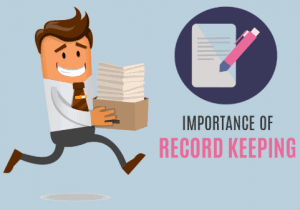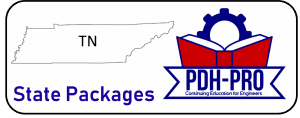CEU Requirements for Tennessee Professional Engineers
Professional engineers in Tennessee are required to earn 24 Professional Development Hours (PDH) every two years. This continuing education requirement can be fulfilled through online courses sanctioned by the Tennessee State Board of Architectural and Engineering Examiners. Engineers can carry forward up to 12 hours into the next renewal period.
Tennessee professional engineers can earn continuing education credits by taking online courses, attending conferences, publishing papers in peer reviewed journals, and participating in live webinars. Other activities are also accepted as noted below.
The Tennessee engineering board makes the licensee responsible for determining if a continuing ed course is suitable for license renewal. Engineers are also responsible for keeping appropriate records to document their CEU activities. The Board allows engineers who are disabled or a deployed military service member to claim an exemption from the continuing education requirements.
Refer to our Tennessee PE renewal page for a summary of all engineering license renewal requirements.
Tennessee PDH Credits
The Board of Architectural and Engineering Examiners manages engineering licensing in the State of Tennessee. According to the rules of the Board, at least 13 hours should be related to technical competency, safety, health and welfare issues. These are the basic requirements in the context of ethical, technical and managerial content for practicing engineering.

Units of continuing education to Professional Development Hours (PDH) are given below:
- 1 university semester hour of credits: 15 PDH
- 1 university quarter-hour of credits: 10 PDH
- 1 Continuing Education Units: 10 PDH
- 1 hour accepted professional development education: 1 PDH
All applicants must present proof of obtaining the required continuing education if the Board requests, during the verification process. There is no need to submit course certificates with your renewal.
Engineers must maintain records of Professional Development Hours (PDH) completion for a minimum of four years. PDH-Pro helps engineers meet this condition by providing an online records management system with the ability to instantly access and print a certificate. These records of completion are maintained indefinitely, in a secure, cloud-based storage system.
License Renewal Dates
The renewal dates of licenses are based upon the date of initial licensure. All certificates of registration issued to engineers require a biennial renewal (every two years) according to requirements of T.C.A. §. 62-2-203(d).
Any engineer can renew a current, valid registration by submitting a renewal form approved by the board, the required renewal fee, and evidence of having completed the number of professional development hours (PDH’s) required by rule. Fees for the biennial renewal of certificates of registration for engineers are $140.00.
Engineering Ethics and Professional Conduct
The Board does not require engineers to complete courses in the area of ethics and professional conduct. However, this topic is accepted and encouraged by the Board as part of the continuing education requirement. Our Ethics and Standards of Professional Conduct Course would be acceptable to the TN Board.
It is necessary for engineers/registrants to maintain proper conduct of practice as per the requirements of Board and state laws. Registrants must fulfill all the obligations to protect the security, health and welfare of the public. If the registrant becomes aware of any decision taken by an employer that is violating the federal laws then he must refuse to obey and inform the concerning authorities.
Records Keeping Requirements for Engineers
Every engineer is required to keeping records that could be used to support claimed credits. These records have to be maintained at least 4 years, and copies should be provided to the Board within thirty 30 days if audited. Failure to maintain records may lead to the disqualification of the engineer.
 Suitable records for continuing education include:
Suitable records for continuing education include:
- PDH credits
- Set of activities
- Location
- Sponsoring organizations
- Duration
- Name of speaker or Instructor
- Description of the activities and
- Completion certificates
- Attendance verification record
- Signed attendance receipt/s
- Payment receipt/
Continuing Education Activities Accepted by the Board
There are certain criteria and set of activities accepted by the board for granting credits. There should be an obvious purpose and objective for all activities which will maintain, improve or expand skills and knowledge. The activities and relevant content must be well organized and planned. The persons making a presentation should be knowledgeable and competent.
A set of continuing education activities may include:
- Attendance at structured seminars and Tutorials
- Courses sponsored by colleges or universities
- Courses which award (CEUs) continuing education unit
- Short course or correspondence course
- TV and online (internet-based) courses
- Inhouse courses organized by different organizations
- Publishing papers, books or articles
- Attending the Board meetings or other relevant events
- Participating in educational activities similar to K-12, Etc
- Participating in tech-related societies or organizations
- Attendance at relevant presentation programs
- Presentation if any made at technological meetings
- And other activities that are in accordance with Board rules
Pre-Approval of Continuing Education Activities
There is no requirement of any pre-approval of course providers or any other special courses. All the engineers have to abide by the terms and conditions of the Board. There is no restriction on an online course as they are recognized and accepted by the Board.
Sources of Free Continuing Education Courses
Luckily, there are various free continuing education courses for engineers. Engineers can avail of these opportunities to save money by joining these programs. Sources of free courses include promotional offers from continuing education providers, getting membership in different engineering societies and educational sessions with manufacturing organizations. Moreover, some state engineering boards also provide free training. All you need is to get some information regarding these free courses.
A list of free courses in the context of continuing education is given below:
- Courses sponsored by engineering societies (ASME, NSPE, ASCE)
- Free webinars (On-demand)
- Free Promos by online course providers
- Free online PDHs for engineers
- Free professional courses for civil engineers.
Engineering Licensing Requirements
Application
An engineer shall pay a nonrefundable $30.00 as an application fee. Any applicant who has passed the required examinations shall also pay a biennial registration fee of $140 to get the certification. However, anyone applying as an engineer by comity shall submit $55 as an application fee. Fees should be submitted duly as prescribed by the board.
Education and experience requirements
Education of 4 years or more approved by the Engineering Accreditation Commission (EAC) of the Accreditation Board for Engineering and Technology (ABET) at the time of graduation. Moreover, education of 2 years when graduation was not more than 2 academic years prior to accreditation may be accepted by the Board. In the case of non-ABET accredited programs, the candidate has to prove its equivalence to ABET-accredited requirements subject to the Board rules.
Experience
Only progressive experience under the supervision of a registered professional engineer shall be considered by the Board. One year of credit experience may be accepted by the Board in the following conditions.
- Graduation with a Master’s degree (or higher) in engineering from an approved curriculum
- One year of experience from established cooperative education program which is within the framework of engineering curriculum and also accepted by the Board.
- Experience of 3 or more years prior to graduation under the supervision of a licensed engineer is also acceptable.
Moreover, Minimum one year experience of engineering must be completed in the USA.
Disciplinary Actions and Restrictions
The applicant is restricted to apply or pass an examination in another jurisdiction when he is banned from taking an examination in Tennessee. A candidate may be barred from taking the examination if he is found violating the Board policies, procedures, and candidate agreements. Disciplinary action may be taken in other cases like:
- Communicating with another candidate during the exams
- Communicating with another candidate the exams
- Cheating of any kind during the examination
- Illegal disclosure of examination content
- Failure to collaborate with the Board or examination authorities
- Actions that can threaten the reliability or security of the examination
Complete Packages for Tennessee Engineers
 PDH-Pro reviews the continuing education requirements for every state annually. We use this knowledge to provide Tennessee Engineering Packages that include all 24 PDH credits and meet all the Tennessee engineering board requirements. We offer CEU packages for chemical, civil, electrical, environmental, geotechnical, mechanical, and structural engineers. These packages allow you to focus on your career, and we take care of the rest.
PDH-Pro reviews the continuing education requirements for every state annually. We use this knowledge to provide Tennessee Engineering Packages that include all 24 PDH credits and meet all the Tennessee engineering board requirements. We offer CEU packages for chemical, civil, electrical, environmental, geotechnical, mechanical, and structural engineers. These packages allow you to focus on your career, and we take care of the rest.
Engineering Discipline Restrictions
Tennessee engineers can complete continuing education courses in disciplines outside their major. For example, a civil engineer can take mechanical or electrical engineering classes. The Board notes that engineering work often requires knowledge of other disciplines so it is important for an engineer to have a broad base of knowledge.
Conclusion
All professional engineers seeking license renewal must fulfill the continuing education requirements established by the Tennessee State Board of Architectural and Engineering Examiners. In case of any confusion, you can contact us anytime. We will be happy to assist you with the selection of your continuing education courses.
